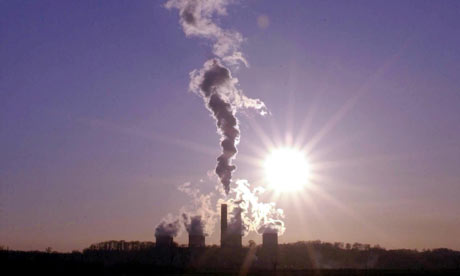
The UK government must place tougher curbs on carbon dioxide emissions through the carbon trading market to meet its climate change targets Photograph: HAYDN WEST/PA
Next week I will be attending - depending on your perspective - either a gathering of evil capitalists seeking to line their pockets while the world fries or an excellent opportunity to learn about, discuss and plan the future of the most important climate policy in play to date.
Last year's Carbon Market Insights Conference, which is aimed at companies and organisations involved in carbon trading, attracted 1,600 delegates from 65 different countries, representing 800 organisations. But that was before the credit crunch and the recent collapse in the price of carbon on the European trading scheme. Both have left even some loyal enthusiasts questioning whether the trading scheme can ever enable investors to confidently back emissions saving projects. The mood and the attendance this year may well be more tempered.
The ETS, and emissions trading in general, has been attracting a fair amount of comment recently, which is a good thing. For too long the public has been largely unaware that markets in greenhouse gas pollution exist and disconnected from the decisions that have been taken about how they should work.
A lack of engagement from civil society on this topic is dangerous since such markets are entirely the construct of civil servants and politicians who are notoriously vulnerable to industry lobbying. Without strong voices to counterbalance the doom mongers claiming tough caps and carbon pricing will put them out of business, you get trading schemes that fundamentally lack the ambition to accomplish the job they are intended to perform.
This failure of ambition has led a number of high profile commentators to attack the system recently. James Lovelock, godfather of the green movement has recently denounced the EU's carbon trading scheme as a scam. Lord Brown, ex-head of BP, one of the first companies to set up an internal carbon market, recently said the policy cannot work on its own.
In the US, where Obama made his intention to introduce Federal level emissions trading very clear, the debate is raging over whether a tax wouldn't be more efficient (outspoken climate scientist James Hansen maintains it would) and the Australian government is under attack from all sides for their proposals for an economy-wide cap and trade scheme, which is too weak for the greens and too ambitious for the industry lobby. This year's Climate Camp protest will focus on emissions trading in London's financial centre.
Yvo de Boer, executive secretary of the UN Framework Convention on Climate Change, is this year's star guest. The future of Kyoto will be a hot topic this year, since the next meeting of parties in December, in Copenhagen, is widely regarded as the "last chance saloon" for reaching a global agreement on what should happen after the current round of targets run out in 2012. That message was reinforced by a major scientific meeting this week - also in Copenhagen.
With vastly more participants in these markets, this is where the real excitement lies. Brokers, bankers, lawyers, accountants, consultants, clean technology providers, software developers and verifiers will all be eagerly awaiting the creation of new schemes. In that sense the spread of emissions trading is part of a potential "Global Green New Deal". Take a pollutant that is currently emitted for the most part freely and without anyone taking much notice and turn it into a commodity and you are almost literally printing money.
Of course the money comes out of the pockets of all those people currently using energy made from fossil fuels but, since the use of such energy correlates pretty well on a global scale with wealth, it is at least one way of making sure that the people causing the problem (which affects everyone) are paying for the solutions.
Emissions trading is far from perfect. It cannot maintain pride of place in our armoury against climate change. I'm particularly interested to see how many people accept this, and are prepared to call for change, and how many are content to carry on with the status quo.
• Bryony Worthington is Founder of Sandbag.org.uk a not-for-profit organisation seeking to engage civil society in improving emissions trading policy. Sandbag is part of the Guardian's Environment Network.



No comments:
Post a Comment